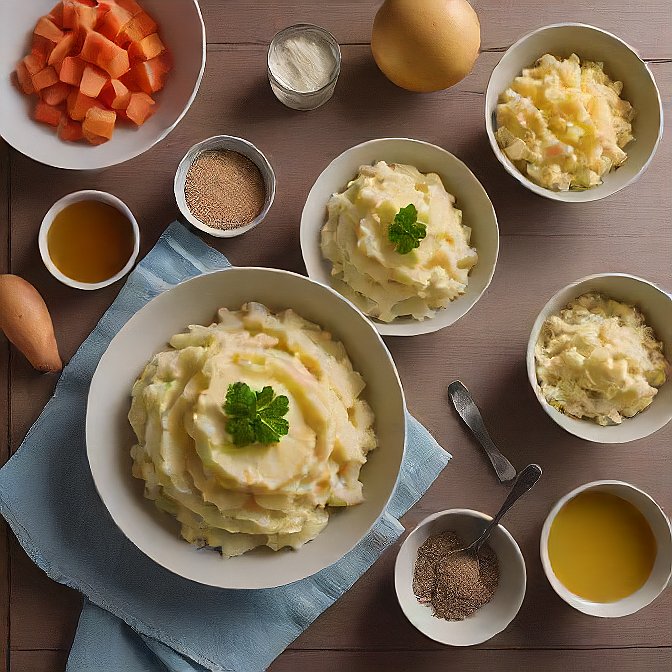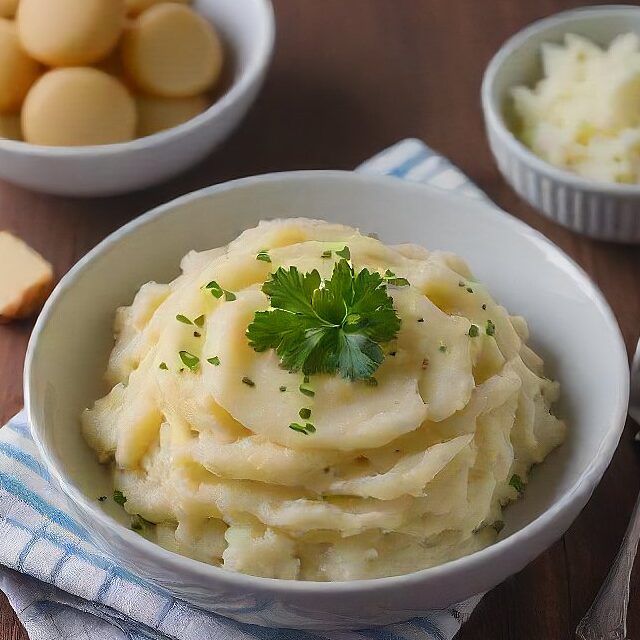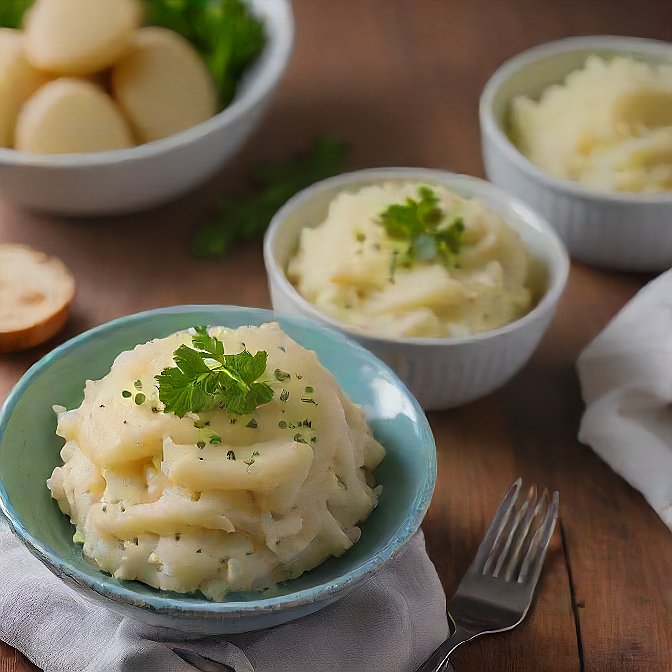Gluten Free Mashed Potatoes
Gluten Free Mashed Potatoes: Creamy, Fluffy, and Delicious
Homemade gluten free mashed potatoes are a classic side dish that can elevate any meal. Whether you’re serving them alongside a succulent roast or pairing them with your favorite gluten-free meatloaf, these creamy and fluffy mashed potatoes are sure to please everyone at the table. Plus, they’re naturally gluten-free, making them perfect for those with gluten sensitivities.

Why Gluten Free Mashed Potatoes?
Many people wonder, are mashed potatoes gluten free? The answer is yes! Traditional mashed potatoes are made from potatoes, butter, milk, and seasoning—all of which are gluten-free ingredients. This makes gluten free mashed potatoes not only safe for those avoiding gluten but also a delicious option for everyone.
In this recipe, I’ll walk you through how to create the perfect gluten free mashed potatoes that are creamy, flavorful, and satisfying. I’ll also provide tips for making gluten free dairy free mashed potatoes for those who are lactose intolerant or following a vegan diet.
Ingredients for Gluten Free Mashed Potatoes
To make gluten free mashed potatoes, you will need:
- 2.5 lbs. russet potatoes: These starchy potatoes are ideal for achieving that fluffy texture. You can also use Yukon gold potatoes for a slightly different flavor.
- ½ teaspoon salt: Used for boiling the potatoes and seasoning.
- 4 tablespoons butter: Adds richness and flavor. For a dairy-free version, use a plant-based butter alternative like Smart Balance.
- ½ cup whole milk: Contributes to creaminess. For a gluten free dairy free mashed potatoes option, use unsweetened almond milk or another plant milk.
- ½ teaspoon salt: For seasoning.
- ¼ teaspoon pepper: To taste.
How to Make Gluten Free Mashed Potatoes
Step 1: Prepare the Potatoes
Start by peeling the russet potatoes and cutting them into smaller pieces, roughly 1-inch cubes. This size ensures even cooking and prevents the potatoes from becoming too mushy. After cutting, rinse the diced potatoes well under cold water to remove excess starch, which helps keep your mashed potatoes light and fluffy.
Step 2: Boil the Potatoes
Place the rinsed potatoes in a large pot and cover them with cold water. Add ½ teaspoon of salt to the water. Bring the water to a boil over high heat. Once boiling, reduce the heat to medium and cook until the potatoes are tender. This typically takes about 15-20 minutes, but it can vary based on the size of your potato cubes. You can check for doneness by piercing a potato with a fork; it should be soft but not falling apart.
Step 3: Drain and Rinse
Once the potatoes are tender, drain them in a colander. Quickly rinse them with warm water to remove any excess starch. This step is crucial for achieving that desired light texture in your gluten free mashed potatoes.
Step 4: Heat the Milk and Butter
In the same pot you used for boiling, heat the milk and butter together. Stir until the butter is fully melted. This step adds flavor and ensures that your mashed potatoes are creamy without being overly heavy.
Step 5: Mash the Potatoes
Add the drained potatoes back into the pot and turn off the heat. For extra smooth and fluffy gluten free mashed potatoes, use a hand mixer to whip the potatoes until they reach your desired consistency. You can also use a potato masher if you prefer a chunkier texture. Be careful not to over-mix, as this can make the potatoes gummy.
Step 6: Season to Taste
Season your mashed potatoes with the remaining salt and pepper. Taste and adjust the seasoning as needed. This is a critical step; you want to enhance the natural flavors of the potatoes.
Step 7: Serve Immediately
Serve your gluten free mashed potatoes hot. They pair beautifully with various dishes, including gluten free fried chicken or grilled meats. If you have any leftovers, store them in an airtight container in the refrigerator.
Storing and Reheating Gluten Free Mashed Potatoes
Leftover gluten free mashed potatoes can be reheated in the microwave, stovetop, or oven. To ensure they remain creamy, add a splash of milk while reheating. This will help restore moisture and texture.
Freezing Mashed Potatoes
Did you know that mashed potatoes freeze well? To freeze, allow them to cool completely before transferring them to an airtight container. Gluten free mashed potatoes can be stored in the freezer for up to two months. When you’re ready to enjoy them again, thaw overnight in the refrigerator and reheat as mentioned above.

Tips for the Best Gluten Free Mashed Potatoes
- Choose the Right Potatoes: For the best results, use starchy potatoes like russets or Yukon golds. Waxy potatoes can yield a dense or gluey texture.
- Cut Larger Pieces: By cutting your potatoes into 1-inch cubes, you reduce the risk of water absorption, maintaining the rich potato flavor.
- Mash While Hot: Mashing the potatoes while they are still warm ensures a smoother texture. A hand mixer works wonders here.
- Taste Before Seasoning: Always taste your mashed potatoes before adding more salt or pepper. It’s easier to add than to take away!
- Make Them Rustic: If you prefer a more rustic style, skip peeling the potatoes. Just wash them thoroughly before cooking.
Variations for Gluten Free Mashed Potatoes
There are endless possibilities to enhance your gluten free mashed potatoes. Here are a few ideas:
- Garlic Mashed Potatoes: Add roasted garlic for a delicious twist.
- Loaded Mashed Potatoes: Mix in bacon, cheese, and sour cream for a hearty option.
- Herb Mashed Potatoes: Stir in fresh herbs like chives or parsley for added freshness.
- Vegan Option: Use plant-based butter and almond milk to make gluten free dairy free mashed potatoes.

Conclusion
In summary, gluten free mashed potatoes are a simple yet satisfying side dish that everyone can enjoy. With just a few ingredients, you can create creamy and fluffy mashed potatoes that complement any meal. So, next time you’re wondering, is mashed potatoes gluten free?, remember that this classic dish is not only safe for gluten-sensitive diets but also incredibly delicious.
Try making gluten free mashed potatoes for your next family dinner and watch them disappear off the table! Whether you choose to keep them traditional or get creative with flavors, this dish is bound to be a hit. Enjoy your cooking!
